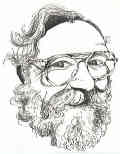We go right back to the year 0002 for this poem, for on August 20 this year was a conjunction between Venus and Jupiter which is now believed to be the Star Of Bethlehem, and referred to in the story of Christ's Nativity.
In reading up on the background of the Three Wise Men, I was surprised to discover that the idea that there were three Magi is only a tradition: the exact number of Magi isn't mentioned, only three are referred when giving the gifts, there might have been more.
Also, what happened to the gifts? Medieval legend states that the gifts were given to Judas to look after - possibly a bad move, in retrospect. Other legends state that they popped them to pawnbroker to fund the Flight to Egypt. I hint at this legend towards the end of the piece.
In reading The Journey of the Magi by T S Eliot, which this poem references throughout, I was also aware that a large chunk of the story was missing. Who was complaining: who was drinking and gambling: who was left out, and why? This poem attempts to address those questions.
I find this poem a bit of a puzzle - it should be ridiculous, but somehow it isn't. It leaves me with a strange frission every time I read it. What do you think? It was broadcast on Roy's Rarebits on BBC Radio Wales on August 20 2006.
The Fourth Magi(With thanks to T.S.Eliot)A cold coming they had of it
Out of the winter hinterlands of the East,
Casper, Melchior and Balthasar
And the other one,
Grumbling at them constantly
Like the galled, sore-footed camels on which they rode,
About how they were late already
According to his calculations,
And what if it wasn't a portent
But just two stars lining up by accident
They'd look a right bunch of idiots,
And how could they follow it
If it was staying in one place,
They'd be better off with a comet,
And that it was this sort of behaviour
That gave Zoroastrian astrology a bad name
In his opinion,
And his voice sang in their ears, saying
That it was all folly,
And that they should have stayed at home in their summer palaces
With the silken girls and the sherbet,
Though sherbet was overrated
As far as he was concerned.
They arrived in the evening, not a moment too soon;
The mother tired, but serene,
The father flushed, feeling useless,
A carpenter not a midwife,
With hands more used to tools,
The boy asleep:
They found the place (you may say) satisfactory.
They gave the gifts they'd born out of the East -
Myrrh for anointing,
Frankincense for perfume,
Gold for wealth,
And a jumper.
And they turned to the other one saying
We thought we said that we'd bring gifts full of portent,
Gifts that resonated with hidden meaning, that foretold,
What symbolism lies in
that object,
And he looked at them, astonished and affronted, and said
It had a reindeer on it!
Then they sat in the midst of the animals in the stalls,
And took wine, and talked of this and that,
And the hard journey they'd had of it,
And the weather
Which made travelling difficult at that time of the year
Particularly with camels,
And the other one drank too deeply,
And ate too well,
And lay down beside the family's beast of burden,
With an arm draped across it's bristled neck
And said that that donkey understood every word he said to it
And would be talking itself in a minute,
And after singing songs of suspicious sentimentality
Fell back into the straw
With red wine staining his white beard,
And snored sonorously,
As he had done the previous afternoon
Throughout King Herod's speech.
Then they rose to depart,
And each in turn spoke to the weary, young mother,
Speaking into her ear in the doorway as they passed
Details of the horoscopes they'd cast,
Details of the life to come,
The successes, the torments, the death,
And the other one spoke to the mother last of all
As her tears flowed,
And patted the small shoulder,
And winked at her as he left.
They watched them ride back into the East,
And the father asked her what the other one had said that made her smile
And the mother replied that he'd said
Next Thursday would be a good day
To sort out financial matters with a friend,
And if it wasn't for the kids, we wouldn't bother, would we?
The father said it would probably be better not to mention him in future.
Each birthday they told the Story of the Gifts to the boy
And they told him of their meaning,
Of kingship, of divine authority,
Of death,
But never of the other one,
Though he would insist on wearing it
Because it was his favourite,
Because it kept him warm,
Because it had
A reindeer on it.
